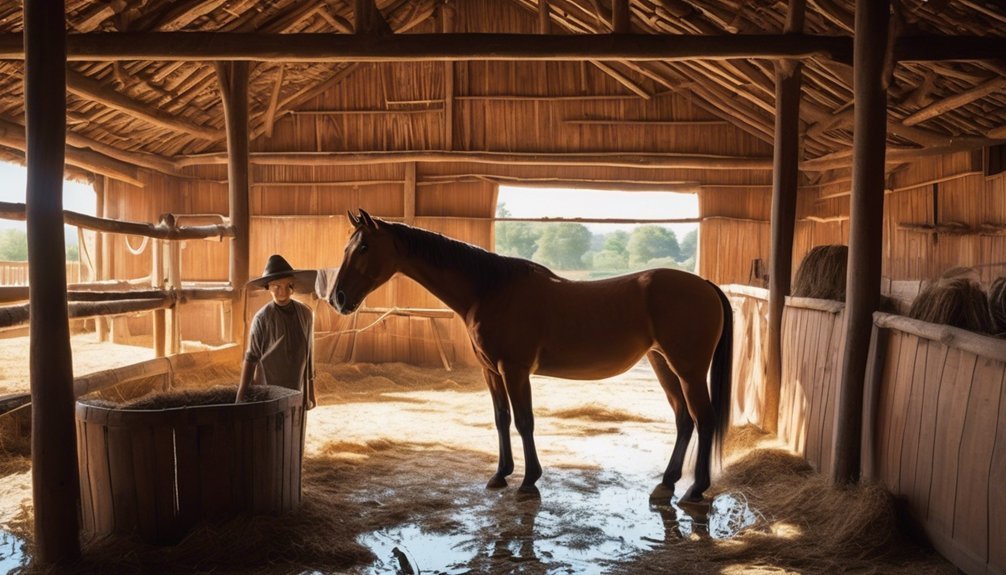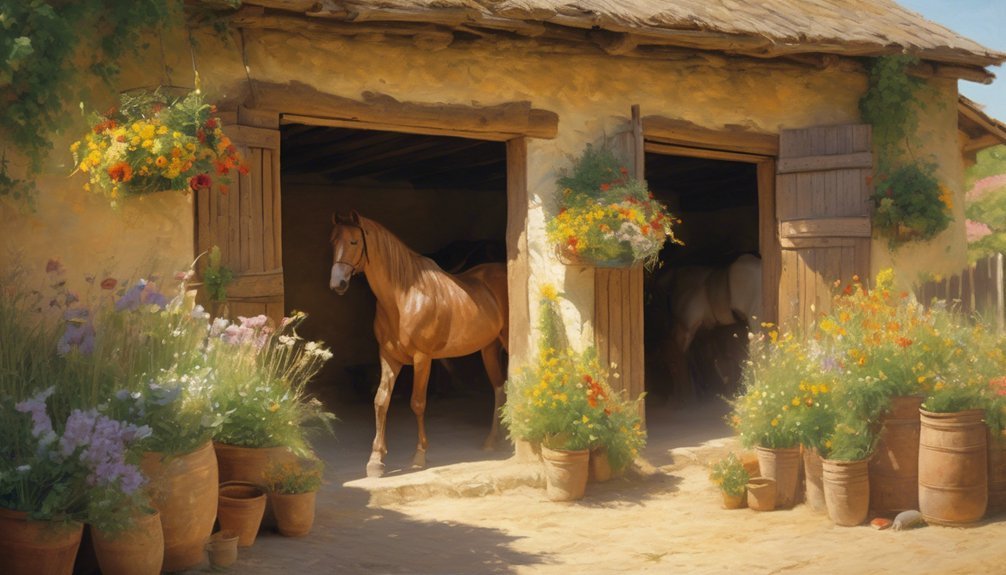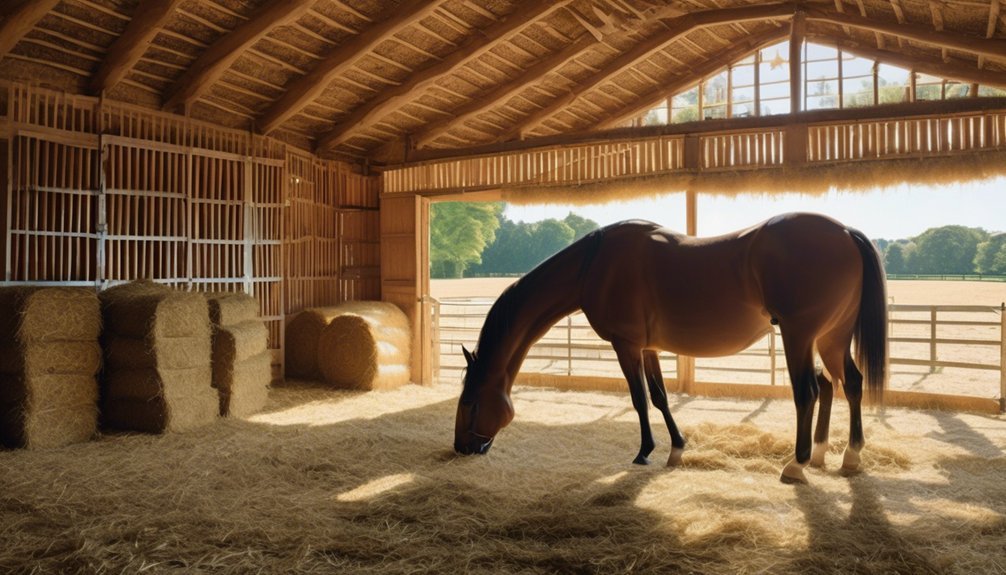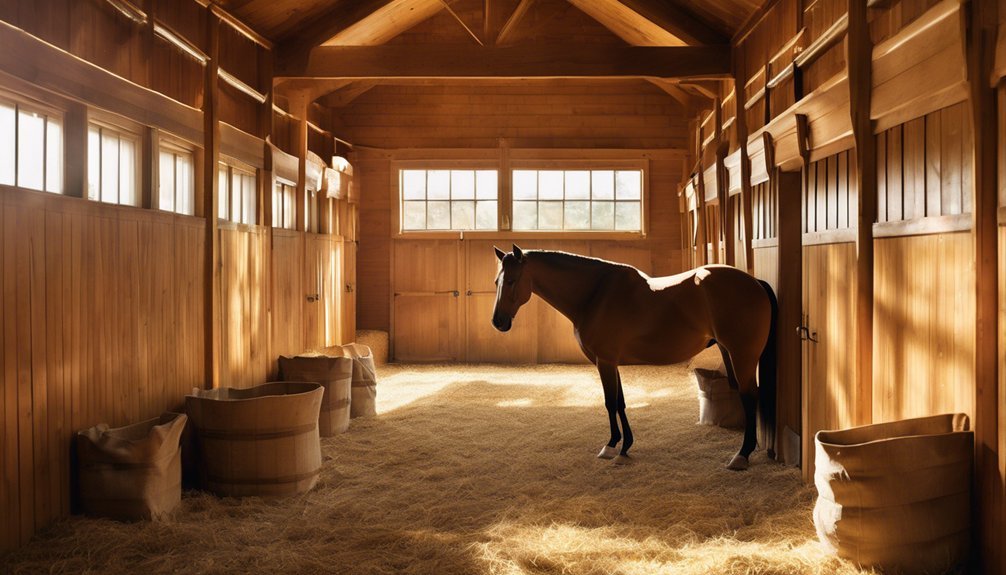
When you think about your horse's well-being, cleanliness in the stable is often overlooked. A tidy environment is vital for preventing diseases and ensuring proper air quality. You'll find that a clean space not only enhances your horse's health but also helps you monitor their behavior more effectively. The benefits extend beyond just hygiene; they create a nurturing atmosphere that strengthens your bond with your equine companion. But what specific practices can you adopt to achieve this?
Key Takeaways
- Clean stables promote horse health by reducing exposure to harmful bacteria, parasites, and digestive issues.
- Regular sanitation practices minimize disease risks, creating a safe environment for horses.
- Enhanced air quality from cleanliness prevents respiratory problems and improves overall well-being.
- Organized spaces reduce injury risks by eliminating hazards and providing secure footing.
- Clean feeding areas and storage prevent contamination, supporting proper nutrition for horses.
Health Benefits for Horses

When you maintain a clean stable, you're not just enhancing the environment for your horse; you're actively promoting their health and well-being. A tidy space reduces the risk of digestive issues by minimizing exposure to harmful bacteria and parasites that can disrupt healthy digestion.
Clean bedding absorbs moisture and keeps your horse comfortable, further aiding in their overall digestive health. Additionally, a spotless environment contributes to stress reduction. Horses are sensitive creatures, and a cluttered or dirty stable can lead to anxiety and unease.
Reducing the Risk of Disease
A clean stable plays a vital role in reducing the risk of disease among horses. By implementing effective disease prevention strategies, you create a safe haven for your equine companions.
Regularly removing manure and soiled bedding is essential; it minimizes harmful bacteria and parasites that thrive in dirty environments. Additionally, practicing stable sanitation practices, such as disinfecting surfaces and equipment, helps eliminate pathogens that could compromise your horse's health.
Pay close attention to water troughs and feed buckets, as these can be breeding grounds for illness if not cleaned regularly.
Your commitment to cleanliness not only protects your horses but also fosters a nurturing environment where they can thrive, allowing you to enjoy their companionship for years to come.
Enhancing Air Quality

While maintaining cleanliness is crucial, enhancing air quality in horse stables is equally important for the health and well-being of your horses.
Proper airflow dynamics and stable ventilation can significantly improve the environment in which your horses live.
Here are four key tips to enhance air quality:
- Ensure Adequate Ventilation: Install windows and vents to promote fresh air circulation.
- Regularly Clean Bedding: Remove soiled bedding to reduce dust and ammonia buildup.
- Use Air Filters: Consider air filtration systems to remove allergens and particulates.
- Monitor Humidity Levels: Maintain ideal humidity to prevent mold and respiratory issues.
Preventing Injuries
Preventing injuries in horse stables is essential for ensuring your horses remain healthy and safe. A clean, organized environment plays a critical role in injury prevention.
Regularly check for loose nails, sharp edges, or debris that could cause harm. Maintain non-slip flooring and keep bedding fresh to provide a secure foothold. Ensure your horses have enough space to move freely without bumping into each other or obstacles.
Additionally, implement a routine for inspecting tack and equipment; worn-out gear can lead to accidents.
Lastly, educate everyone involved in stable care about stable safety practices. By prioritizing cleanliness and attention to detail, you create a nurturing environment that allows your horses to thrive, reducing the risk of injury and fostering a sense of peace.
Facilitating Behavior Monitoring

Monitoring horse behavior is crucial for maintaining their well-being and can be greatly facilitated by a clean and orderly stable environment.
A tidy space not only promotes health but also allows you to observe your horse's behavior more effectively.
Here are four ways cleanliness aids behavior observation:
- Clear Visibility: A clean stable makes it easier to spot changes in your horse's posture or movement.
- Reduced Stress: An organized environment can lower stress levels, leading to more natural behavior.
- Routine Consistency: A clean stable supports stable routines, helping you identify any deviations in behavior.
- Health Monitoring: Regular cleaning allows you to check for signs of illness or discomfort.
Improving Work Efficiency
A clean and organized stable not only enhances behavior monitoring but also significantly improves work efficiency.
When you maintain a tidy environment, you streamline your daily routines, allowing for better time management. You'll find that tasks are easier to delegate, as everyone can quickly locate tools and supplies. This clarity minimizes disruptions and fosters a smoother workflow, giving you more time to connect with your horses.
By prioritizing cleanliness, you create a space that encourages focused work rather than chaotic searching. You can then invest your energy into nurturing your equine companions, ensuring their well-being while enhancing your productivity.
Ultimately, a tidy stable makes both your job and your horses' lives more enjoyable.
Creating a Positive Atmosphere

While the physical cleanliness of a stable is crucial, creating a positive atmosphere is equally important for both you and your horses. A harmonious environment enhances stable aesthetics and supports their emotional well-being.
Here are four ways to cultivate that space:
- Personal Touch: Add personal items like photos or decorations that resonate with you and create warmth.
- Natural Elements: Incorporate plants or natural light to promote a serene ambiance.
- Soothing Sounds: Play gentle music or nature sounds to alleviate stress for both you and your horses.
- Routine Engagement: Spend quality time grooming and interacting with your horses, fostering trust and connection.
Simplifying Waste Management
Effective waste management in horse stables is essential for maintaining a clean environment and ensuring the health of your horses. You can simplify waste disposal by establishing a routine.
Regularly clean stalls, removing manure and soiled bedding, which helps prevent disease and keeps your horses comfortable. Consider composting as a sustainable option; it not only reduces waste but also enriches your soil.
The composting benefits include creating a natural fertilizer for your garden, promoting a healthier ecosystem. By involving your family or stable staff in this process, you create a shared responsibility and foster a deeper connection with your horses' well-being.
Keeping things organized and consistent makes a significant difference in your stable's overall cleanliness and health.
Supporting Proper Nutrition

Maintaining a clean and organized stable environment naturally leads to better focus on your horses' nutrition.
When you prioritize cleanliness, you can more easily assess their feed quality and ensure they achieve a proper nutritional balance.
Here are four key elements to consider:
- Choose high-quality feed: Invest in top-notch grains and hay that meet your horse's specific needs.
- Monitor feed storage: Keep feed in airtight containers to prevent contamination and spoilage.
- Regularly clean feeding areas: Remove leftover feed to discourage pests and mold.
- Consult with a nutritionist: Work with an expert to tailor a diet that supports your horse's health.
Building a Stronger Human-Horse Bond
A strong bond between you and your horse enhances not only your riding experience but also your horse's overall well-being.
Trust development is key; when you spend quality time grooming, feeding, and simply being present, you're laying the foundation for that trust. Your horse senses your emotions, so approach each interaction with patience and kindness.
This emotional connection fosters a sense of safety, encouraging your horse to open up to you. Use gentle cues and consistent routines to reinforce this bond.
Remember, the more you engage with your horse on a personal level, the deeper your relationship grows.
Ultimately, a strong human-horse bond leads to improved communication and cooperation, making your partnership truly rewarding.
Frequently Asked Questions
How Often Should I Clean My Horse's Stable?
You should clean your horse's stable daily to maintain optimal horse health. This stable cleaning frequency helps prevent illness, promotes comfort, and fosters a strong bond between you and your horse, ensuring they thrive in a clean environment.
What Cleaning Supplies Are Safe for Horses?
When choosing cleaning supplies, opt for safe disinfectants like diluted vinegar or hydrogen peroxide. Eco-friendly options, such as biodegradable soaps, keep your horse's environment healthy while ensuring their comfort and well-being. You're caring for them beautifully.
Can I Use Natural Products for Stable Cleaning?
Yes, you can absolutely use natural cleaning products for your stable. Eco-friendly solutions like vinegar, baking soda, and essential oils not only clean effectively, but they also promote a healthier environment for both you and your horse.
How Do I Handle Bedding Disposal?
So, you're thrilled about disposing of bedding types, huh? Don't worry! You can compost, use a dumpster, or spread it in your garden. Just choose a disposal method that suits your needs and keeps everyone happy!
What Are the Signs of an Unclean Stable?
You'll notice signs of an unclean stable through strong odors and increased pest activity. Regularly inspect for droppings and damp bedding; these issues can compromise your horse's health and well-being, making proactive care essential.
Conclusion
In conclusion, keeping your horse stable clean isn't just about aesthetics; it's a vital part of their well-being. Did you know that a tidy stable can reduce respiratory issues in horses by up to 70%? By prioritizing cleanliness, you're not only safeguarding your horse's health but also nurturing a deeper bond with them. When you create a safe and positive environment, you lay the foundation for a happy, thriving horse who can truly flourish.





